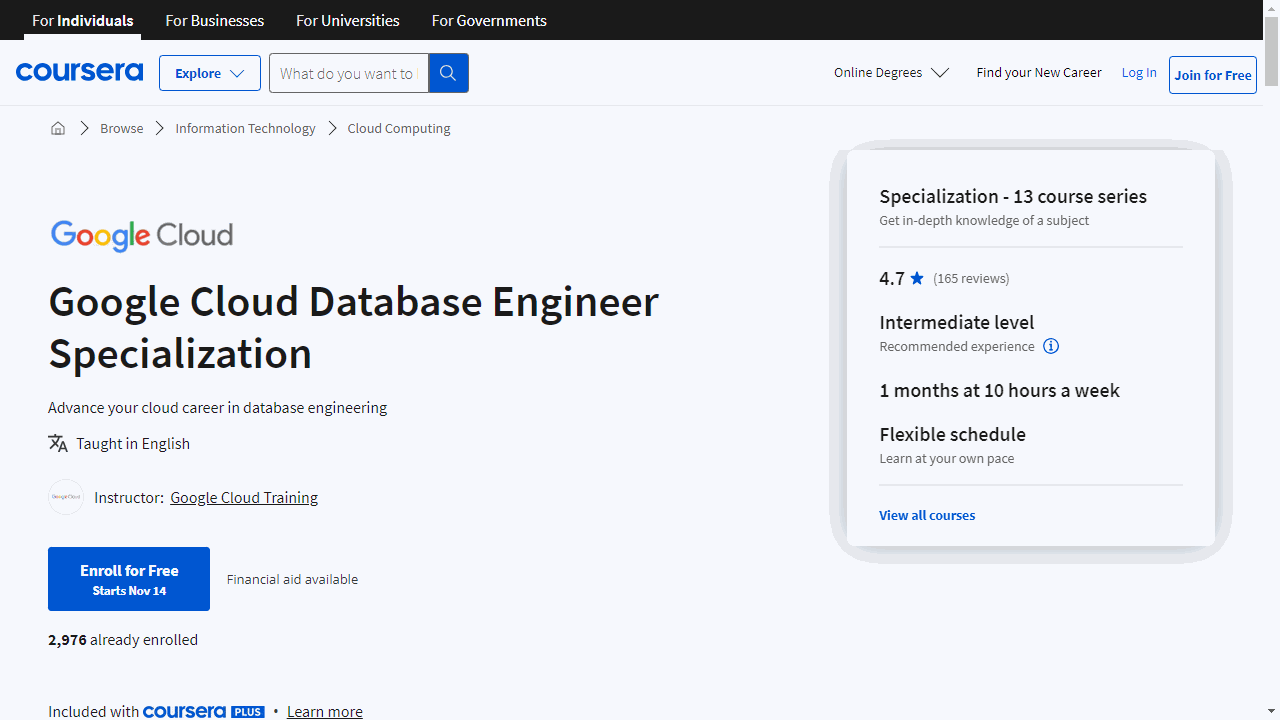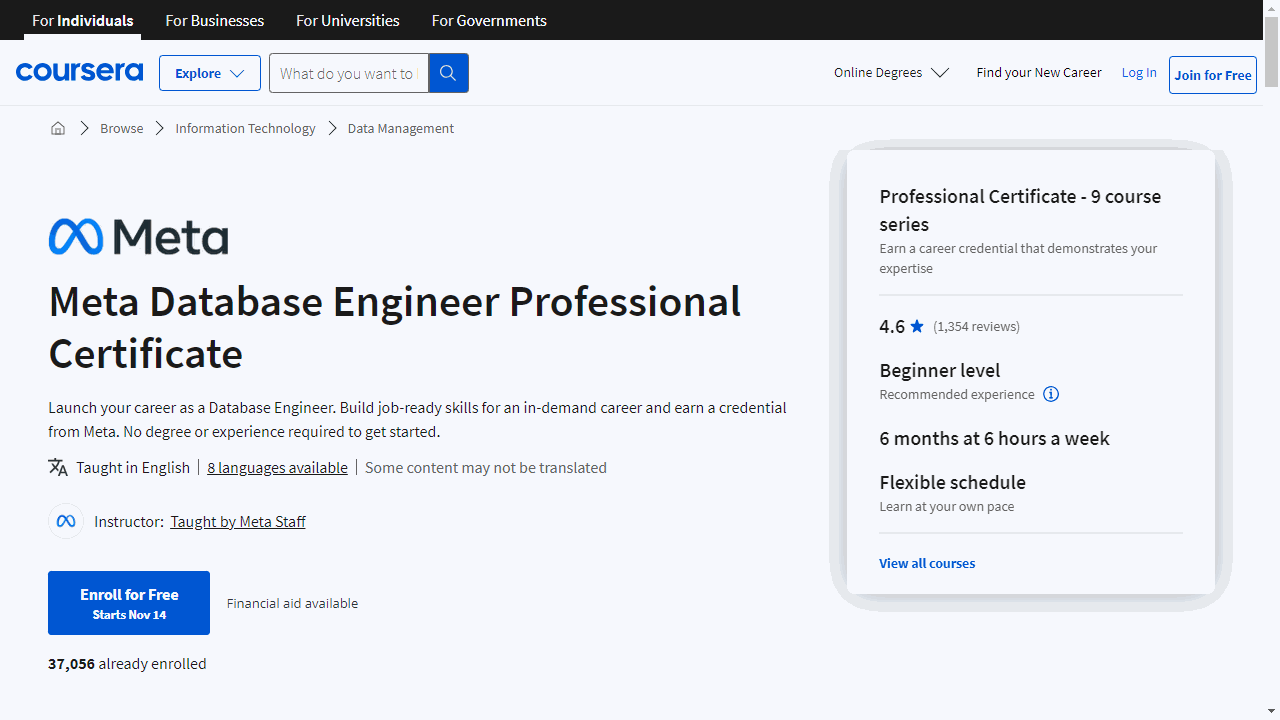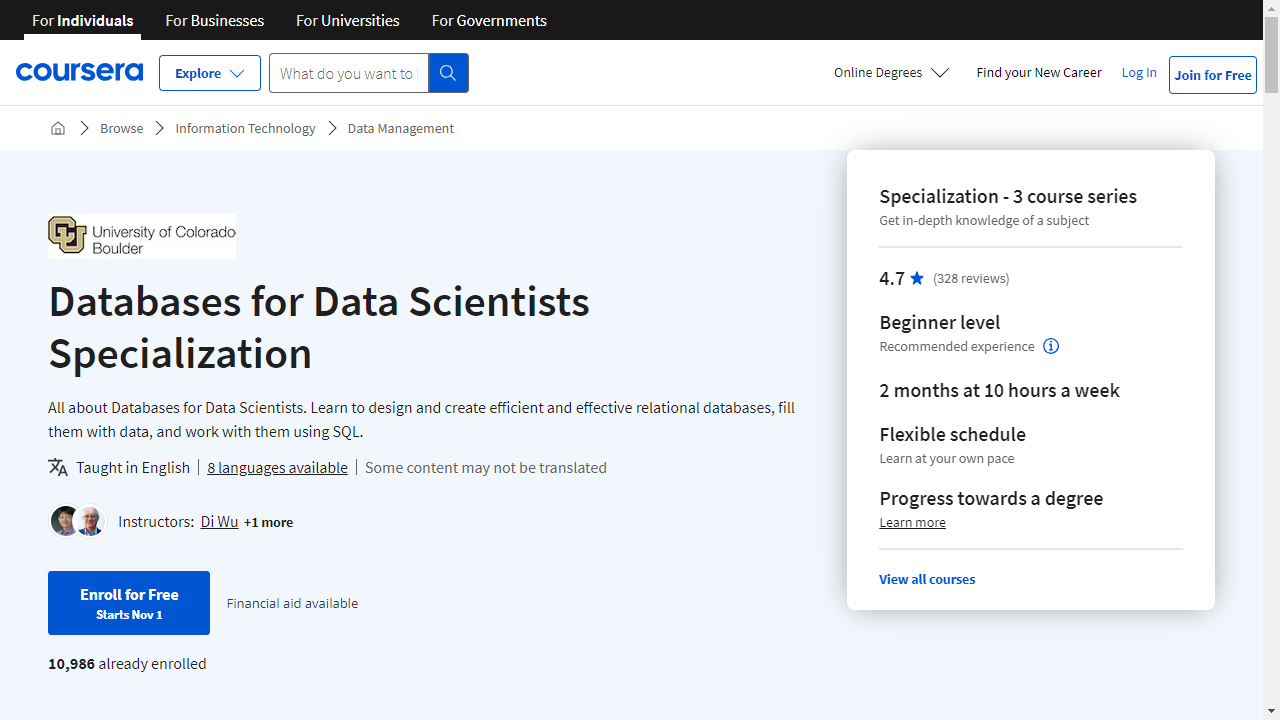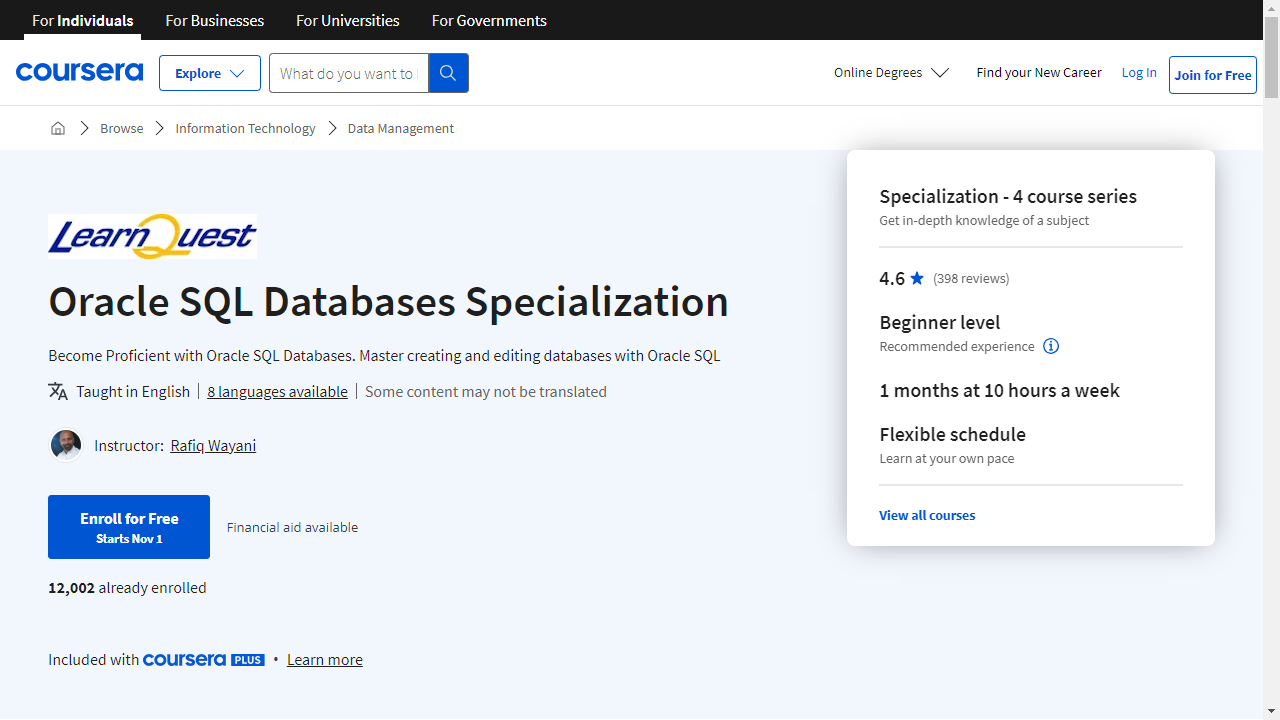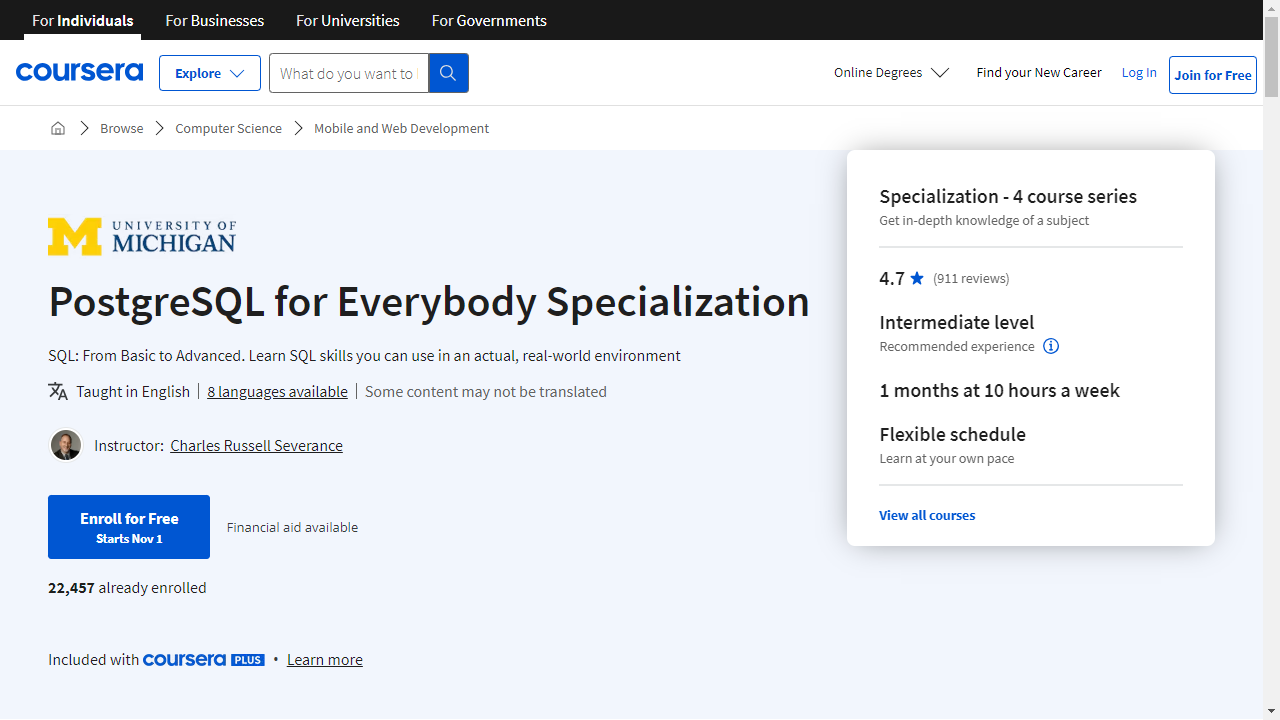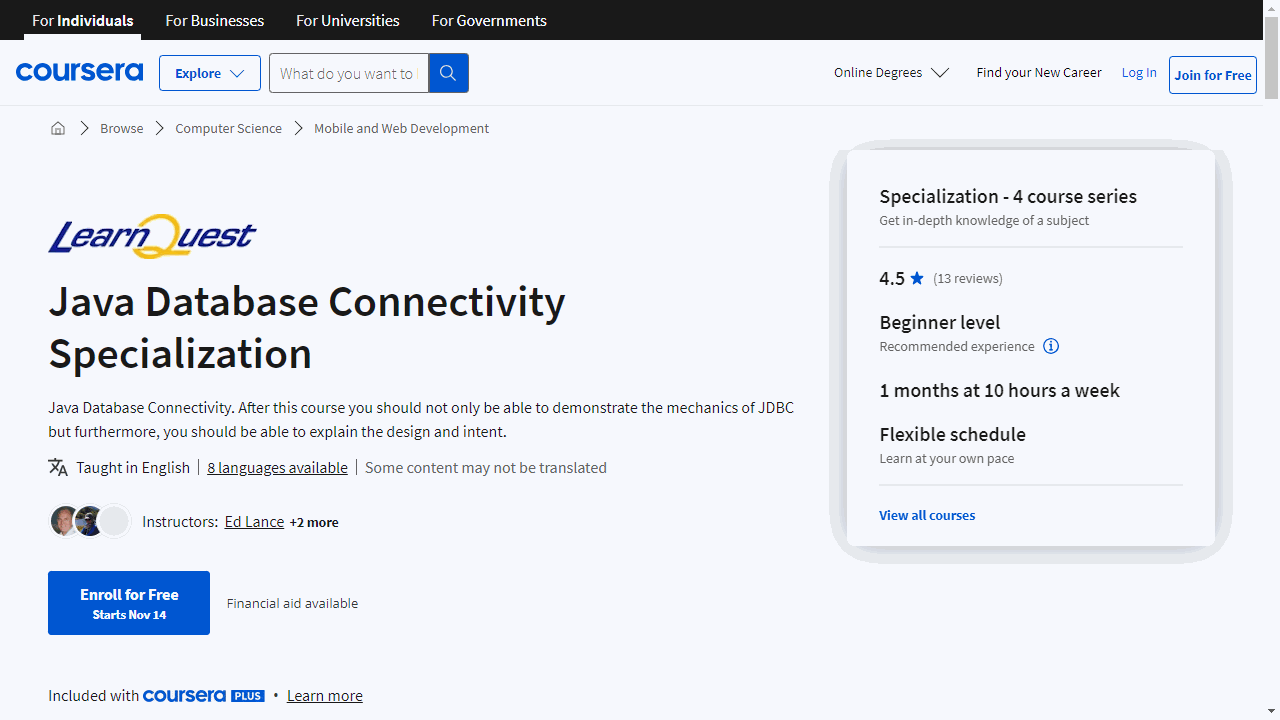Learning about databases can be a daunting task, especially if you’re new to the field.
There are so many different concepts to understand, and so many different tools and technologies to learn.
It can be hard to know where to start, and even harder to find a course that’s comprehensive enough to cover everything you need to know.
We know the struggle of finding a good database course.
You want something that’s engaging, practical, and taught by experts.
You want a course that’s challenging but not overwhelming, that’s up-to-date with the latest technologies, and that will help you build the skills you need to succeed.
For the best database course overall, we recommend Google Cloud Database Engineer Specialization.
This specialization offers a comprehensive look at Google Cloud’s database services, taking you from beginner to professional.
You’ll learn about everything from basic database principles to advanced topics like Cloud Spanner and data migration.
But this is just one of many great options.
We’ve reviewed a number of other top-rated database courses on Coursera, focusing on a variety of database management systems, including SQL, MySQL, PostgreSQL, Oracle, and more.
We’ve also included options that focus on specific skills, such as data engineering, data modeling, and database security.
Keep reading to find the perfect database course for you.
Google Cloud Database Engineer Specialization
This specialization offers a blend of theoretical knowledge and practical skills, essential for mastering Google Cloud’s database services.
Begin with “A Tour of Google Cloud Hands-on Labs,” where you’ll get a practical introduction to the Google Cloud Platform.
This course demystifies the cloud environment, teaching you how to manage projects and understand IAM roles and permissions through direct interaction with the Cloud Console.
Building on that foundation, “Google Cloud Fundamentals: Core Infrastructure” delves into the essential concepts and services of GCP, like Bigtable, Firestore, and Kubernetes Engine.
You’ll learn to construct a basic infrastructure and explore various storage options, setting the stage for more advanced topics.
“Cloud SQL for MySQL: Qwik Start” offers a concise, hands-on approach to creating and managing a Cloud SQL MySQL instance.
It’s a straightforward course that gets straight to the point, showing you how to perform SQL operations effectively.
If you’re considering a move from Amazon RDS to Cloud SQL, the course “Migrating to Cloud SQL from Amazon RDS for MySQL Using Database Migration Service” provides a clear roadmap.
It guides you through a one-time migration, ensuring a smooth transition for your MySQL data.
Similarly, “Migrating On-premises MySQL Using a Continuous Database Migration Service Job” is tailored for those looking to shift from an on-premises setup to Cloud SQL.
This course emphasizes the importance of continuous migration, allowing for real-time data syncing.
PostgreSQL enthusiasts will appreciate courses like “Migrate to Cloud SQL for PostgreSQL using Database Migration Service” and “Connect an App to a Cloud SQL for PostgreSQL Instance.”
These courses cover the essentials of migrating databases and integrating them with applications, a critical skill for any data engineer.
Security is paramount in data management, and “Securing a Cloud SQL for PostgreSQL Instance” addresses this head-on.
You’ll learn to implement robust security measures, ensuring your databases are protected against unauthorized access.
Data recovery is another critical area covered in “Configure Replication and Enable Point-in-Time-Recovery for Cloud SQL for PostgreSQL.”
This course teaches you how to set up replication and perform point-in-time recovery, providing peace of mind by safeguarding against data loss.
For a deep dive into Google’s horizontally scalable database, “Cloud Spanner - Loading Data and Performing Backups” and “Cloud Spanner - Defining Schemas and Understanding Query Plans” offer a comprehensive look at Cloud Spanner’s capabilities, from data insertion to query optimization.
The practical application of these skills is showcased in “Deploy a Modern Web App connected to a Cloud Spanner Instance,” where you’ll build and deploy a web application that interacts with Cloud Spanner, reinforcing the real-world relevance of the skills you’ve acquired.
Lastly, “Enterprise Database Migration” is the capstone of this specialization.
It’s designed for those tasked with large-scale database migrations, covering the intricacies of moving enterprise databases like SQL Server and Oracle to Google Cloud.
Meta Database Engineer Professional Certificate
The journey begins with “Introduction to Databases,” where you’ll gain a foundational understanding of database principles and get to grips with SQL.
This course sets the stage for what’s to come, ensuring you have a strong base to build upon.
Moving on to “Version Control,” you’ll learn the essentials of collaborative software development.
This course teaches you how to use Git and Linux commands, tools that are crucial for managing complex projects and workflows.
As you progress to “Database Structures and Management with MySQL,” your SQL skills will deepen.
You’ll learn to manipulate databases with more sophisticated queries and understand the importance of database relationships and normalization.
“Advanced MySQL Topics” is where your database skills become more nuanced.
You’ll tackle complex SQL statements, learn to optimize queries, and understand advanced features like triggers and events.
This course is about refining your skills and preparing you for more complex database tasks.
With “Programming in Python,” you’ll step into the world of programming, learning Python from the ground up.
This course is essential for back-end development and database engineering, as Python is a key language in these domains.
In “Database Clients,” you’ll bridge the gap between Python programming and database management, learning to create applications that interact with MySQL databases.
This skill is invaluable for developing custom database solutions.
“Advanced Data Modeling” takes you into the realm of data warehousing and ETL processes.
Here, you’ll learn about the storage, optimization, and administration of large-scale databases, preparing you for challenges in managing big data.
The “Database Engineer Capstone” project is where you’ll apply everything you’ve learned.
You’ll build a database solution from the ground up, demonstrating your ability to tackle real-world problems.
Lastly, “Coding Interview Preparation” will help you navigate the job market.
This course provides insights into the interview process, teaching you how to approach coding problems and communicate effectively.
Throughout the certificate program, you’ll develop a diverse set of skills, including database design, MySQL, Python programming, and more.
The courses are structured to build on each other, ensuring a smooth learning curve.
This professional certificate is accessible to anyone eager to learn, regardless of previous education or experience.
Databases for Data Scientists Specialization
This series of courses is a goldmine of knowledge if you want to dive deep, offering a comprehensive understanding of not only SQL, but also databases in general.
The first course, “Relational Database Design,” guides you through the process of building a database from scratch.
You’ll learn how to create Entity Relationship Models and Diagrams, create Relational Models, and normalize a Relational Model to 3NF.
The course is highly rated, with a score of 4.6 out of 5, and it’s part of CU Boulder’s Master of Science in Data Science (MS-DS) degree, which adds to its credibility.
Next up is “The Structured Query Language (SQL)” course.
This course dives deep into the world of SQL, teaching you the origins of the language, its conceptual foundations, and how to use SQL commands to analyze data within a relational database.
It’s a highly comprehensive course, covering not only data retrieval but also the creation and maintenance of database objects.
The final course, “Advanced Topics and Future Trends in Database Technologies,” explores in-depth and advanced areas of database technologies and gives you a glimpse into the future of database software. You’ll learn about NoSQL implementations like MongoDB, Cassandra, Redis, and Neo4j.
Like the other specializations I presented here, what sets these courses apart is their practical approach.
You won’t just learn theory; you’ll practice real-life mini cases, which will make you confident and comfortable with databases and SQL.
Plus, all these courses can be taken for academic credit as part of CU Boulder’s MS-DS degree, which is a huge bonus.
Oracle SQL Databases Specialization
This specialization is designed to take you from a beginner to a proficient user of the Oracle database environment, which corresponds to 28.6% of the database market share.
As it’s very focused on Oracle, it’s not the best choice if you want to learn SQL in general, but I added it here for completeness.
The first course, Oracle Database Foundations, is designed to provide you with the foundational knowledge you’ll need to navigate the Oracle database environment. It covers everything from the types of databases to database design and architecture.
Next up is the Oracle Database Platform course.
This course introduces both GUI and command-line tools, allowing you to navigate the Oracle database environment with ease.
The third course, Oracle SQL Basics, is where you’ll start to dive into the key elements of the Structured Query Language specific to Oracle.
Finally, the Oracle SQL Proficiency course delves deeper into the Create, Alter, and Update commands, explores database relationships, and demonstrates how to use database views and SQL functions.
PostgreSQL for Everybody Specialization
This series of courses is designed to take you from a beginner to an advanced level in SQL and PostgreSQL, a popular open-source relational database management system.
The first course, “Database Design and Basic SQL in PostgreSQL” covers the historical design of databases and the use of SQL in the PostgreSQL environment.
You’ll learn how to create tables, define the schema of your data, and represent one-to-many and many-to-many relationships. The course also includes hands-on assignments, which are a great way to apply what you’ve learned.
Next up is “Intermediate PostgreSQL.”
This course dives deeper into SQL techniques, covering aggregation, transactions, reading and parsing CSV files, and more. You’ll also learn how PostgreSQL handles and indexes text data.
The third course, “JSON and Natural Language Processing in PostgreSQL,” is a standout.
It’s unique in that it focuses on how PostgreSQL creates and uses inverted indexes for JSON and natural language content. You’ll get to work with various sources of data, including online APIs, and build your own inverted indexes.
The final course, “Database Architecture, Scale, and NoSQL with Elasticsearch,” explores database architecture, PostgreSQL, and scalable deployment configurations.
You’ll learn about Elasticsearch NoSQL, a common NoSQL database used for high-speed search and indexing.
Java Database Connectivity Specialization
This series of courses is meticulously designed to build your expertise in Java and databases from the ground up.
Starting with the “Java Database Connectivity (JDBC) Introduction,” you’ll gain a solid understanding of JDBC, a critical API that facilitates the interaction between Java applications and databases.
This course isn’t just about learning the mechanics; it’s about grasping the rationale behind JDBC’s design, setting a strong foundation for more advanced concepts.
Moving on to “Prepared Statements and Stored Procedures,” you’ll build upon the basics and learn to refine your database interactions.
PreparedStatements offer a robust way to execute SQL statements, providing efficiency and security.
The course also introduces Stored Procedures, allowing you to encapsulate complex logic within the database server.
Additionally, you’ll explore how to navigate database metadata and adapt to various SQL dialects through JDBC escape syntax.
For those who might feel intimidated by SQL, the “Java Data Access - SQL Primer” course is the perfect starting point.
It breaks down the essentials of SQL, teaching you how to create, query, and manipulate tables.
You’ll get comfortable with joins and subqueries, setting the stage for more complex database operations.
The specialization culminates with the “Jakarta Persistence (JPA)” course, where you’ll learn to seamlessly connect Java objects with database tables.
Through JPA, you’ll discover how to use annotations for mapping, simplifying CRUD operations, and employing various query methods to retrieve and manipulate data efficiently.
Throughout the specialization, you’ll acquire practical skills such as JDBC, JPA, and SQL, complemented by hands-on exercises that reinforce your learning.
The inclusion of Junit testing ensures that you not only write functional code but also maintain high-quality standards.
